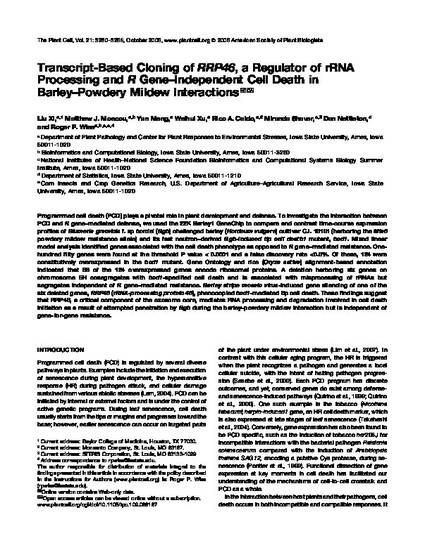
Programmed cell death (PCD) plays a pivotal role in plant development and defense. To investigate the interaction between PCD and R gene–mediated defense, we used the 22K Barley1 GeneChip to compare and contrast time-course expression profiles of Blumeria graminis f. sp hordei (Bgh) challenged barley (Hordeum vulgare) cultivar C.I. 16151 (harboring the Mla6 powdery mildew resistance allele) and its fast neutron–derived Bgh-induced tip cell death1 mutant, bcd1. Mixed linear model analysis identified genes associated with the cell death phenotype as opposed to Rgene–mediated resistance. One-hundred fifty genes were found at the threshold P value < 0.0001 and a false discovery rate bcd1mutant. Gene Ontology and rice (Oryza sativa) alignment-based annotation indicated that 68 of the 124 overexpressed genes encode ribosomal proteins. A deletion harboring six genes on chromosome 5H cosegregates with bcd1-specified cell death and is associated with misprocessing of rRNAs but segregates independent of R gene–mediated resistance. Barley stripe mosaic virus-induced gene silencing of one of the six deleted genes, RRP46 (rRNA-processing protein 46), phenocopied bcd1-mediated tip cell death. These findings suggest that RRP46, a critical component of the exosome core, mediates RNA processing and degradation involved in cell death initiation as a result of attempted penetration by Bgh during the barley–powdery mildew interaction but is independent of gene-for-gene resistance.
Available at: http://works.bepress.com/dan-nettleton/123/

This article is published as Xi, Liu, Matthew J. Moscou, Yan Meng, Weihui Xu, Rico A. Caldo, Miranda Shaver, Dan Nettleton, and Roger P. Wise. "Transcript-based cloning of RRP46, a regulator of rRNA processing and R gene–independent cell death in barley–powdery mildew interactions." The Plant Cell 21, no. 10 (2009): 3280-3295. doi: 10.1105/tpc.109.066167.